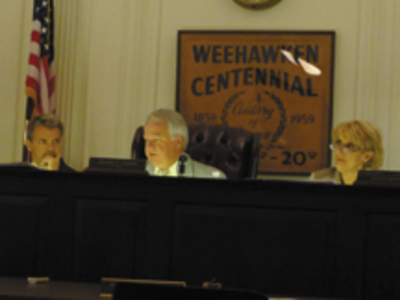The reverberations from the deadly midair collision over the Hudson River on Aug. 8 that claimed nine lives continue to be felt in communities along the river, reviving concerns over aircraft noise and safety in the busy air corridor.
The Weehawken Town Council passed a resolution expressing the need for more federal regulation over the Hudson River airspace at its meeting this past Tuesday.
Mayor Richard Turner said that out of concern for residents, especially those living on the waterfront, he had spoken to federal officials about the safety issues posed by the lack of air traffic control by the Federal Aviation Administration (FAA) over airspace below 1,100 feet. Turner also expressed concern about the increase in aircraft traffic near the Hudson.
“We’ve been in contact with various public officials,” said Turner. “There has been a growing concern with some of the residents on the waterfront as to the volume of low flying helicopter and plane traffic.”
Turner then added: “We’re going to be working with waterfront residents and federal officials to see what we can accomplish.”
Noise complaints
In the last few years, several readers have submitted letters to the editor of the Reporter in which they described discovering the nuisance of low flying aircraft.
Recommendations for safer air tours have been made for the past 22 years by the National Transportation Safety Board.
________
Rogaski also noted: “They fly non-stop, one after another, beginning early in the morning till late at night. They hover over the Hoboken/Weehawken area to land and take off. These helicopters seem to have no regulations regarding the height at which they fly nor the space in between them.”
Turner said Tuesday that other residents had commented on the noise level too.
Turner also said that he is aware that the National Transportation Safety Board (NTSB) has made recommendations to the FAA about regulating low flying aircraft for over 20 years.
The NTSB classifies itself as “an independent federal agency charged by Congress to investigate every civil aviation accident in the United States.” The NTSB also oversees significant accidents and makes recommendations in accidents involving other modes of transportation.
In June alone, the NTSB recorded 132 U.S. civil aviation accidents, which included four accidents in which commercial air carriers were involved, and 31 which had fatal outcomes with 52 deaths.
“For over 40 years we have been making recommendations to the FAA,” said Keith Holloway, a representative from the public affairs office at the NTSB. “Recommendations for [safer] air tours have been made for the past 22 years. About 80 percent of our recommendations have been adopted by the FAA, but we want them to adopt 100 percent of them.”
Air traffic controllers
On Aug. 17, the NTSB informed Patrick Forrey, president of the National Air Traffic Controllers Association (NATCA), that the NATCA was being removed from assisting in the investigation involving the Hudson crash because they had publicly commented on information about the accident under investigation.
Typically, the NTSB can request assistance from other agencies during an investigation but makes them sign an agreement that prohibits them from disclosing information.
Speculation remains over the role of an air traffic controller at Teterboro airport. Reports say that the controller in Teterboro was on his cell phone attending to a personal call at the time the collision occurred.
Melissa Rappaport may be reached at mrappaport@hudsonreporter.com
